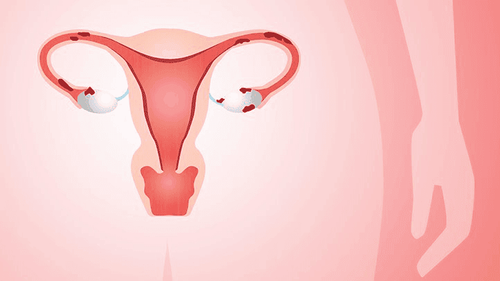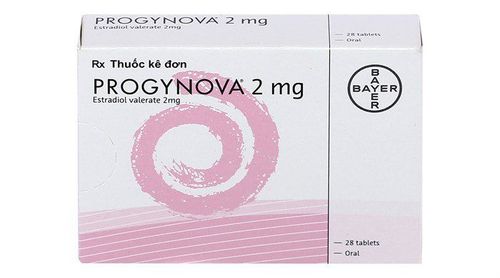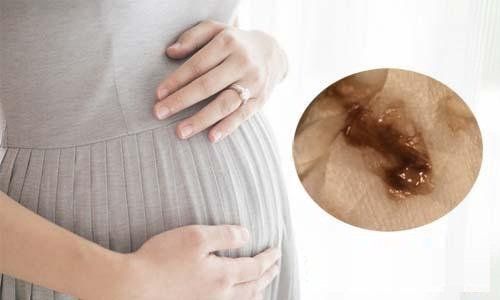The navel is the most susceptible place for infection in newborns because of the umbilical cord cut after birth, which is considered an open wound on the baby's body. If the umbilical cord cutting tools and daily dressing changes are not properly sterilized, the navel will face a very high risk of infection.
1. Is it okay for a newborn's umbilical cord to be wet?
Most newborns will have their umbilical cord fall off within the first 2 weeks after birth, except in some special cases such as the baby having umbilical lymph nodes or the umbilical blood vessels drying slowly. Therefore, for some babies who are 10 days old and the umbilical cord has not fallen off, parents should not worry too much. However, parents need to clean and care for the baby's umbilical cord every day to monitor and detect any abnormalities if any.
Normally, before falling off, the baby's umbilical cord may ooze a little wet fluid, there may be a little brown due to a little blood clot on the cut surface of the umbilical cord, but there should absolutely be no green or yellow pus, no foul odor, and the area around the umbilical cord should not be red or swollen, the baby does not have a fever and feeding and sleeping activities are still normal. Mothers need to keep the umbilical cord open, do not bandage the umbilical cord. Clean the umbilical cord every day, pay attention to cleaning the umbilical cord area and dry it, keep it open.
2. Be careful when the newborn's navel smells bad
If the newborn's navel smells unusually bad, parents need to take the baby to see a pediatrician immediately. In cases where the baby has an umbilical cord bud (granuloma), the baby's navel often falls off slowly and has fluid. When the newborn's navel is wet due to an unusual amount of fluid coming out of the navel and falling off slowly compared to other babies, parents should take the baby to see a pediatrician to determine whether the baby has an umbilical cord bud or if the umbilical cord still exists. From there, the doctor will have appropriate treatment and management.
If the newborn's navel smells unusually bad, parents need to take the baby to see a pediatrician immediately

3. Abnormalities in the navel of newborns
Localized navel infection
If you observe a loss of the normal boundary between the skin and the umbilical cord, the umbilical cord is red and inflamed with pus, sometimes bleeding, it is very likely that the baby has an umbilical infection that needs immediate antibiotic treatment.
Home care is essential, mothers need to take care of the navel by washing it 1-2 times a day with 0.9% saline and take the baby for a re-examination if the navel still has pus or fluid after 2 days or when the infection is more severe.
Prevent local umbilical infection by sterilizing before and after birth. Cut and tie the navel with sterile instruments, relatives should wash their hands before taking care of the baby. Leave the navel open and dry, avoid applying chemicals or foreign objects to the navel, do not cover it tightly to make the navel dry and fall off quickly.
Disseminated umbilical infection
This is a severe umbilical infection that spreads to the surrounding connective tissue, causing red, hard inflammation around the navel, creating an umbilical areola with a diameter greater than 2cm. The child has symptoms of systemic infection (high fever, lethargy, refusal to breastfeed).
Umbilical tetanus
Clostridium tetani bacteria enter the child's body through the umbilical cord incision. After tetanus bacteria enter the child's body, it usually does not cause obvious symptoms immediately during the incubation period (about 7 days).
In the full-blown period, the child has a fever of 38 - 39 degrees Celsius, sometimes up to 40 - 41 degrees Celsius, fussiness, refusal to breastfeed, the jaw becomes increasingly stiff, gradually convulsions and stiffness appear, the newborn's face is wrinkled, the mouth is pursed, foaming at the mouth, and the hands are clenched. If the convulsions are continuous, they will be accompanied by episodes of apnea, causing the child to turn purple, have cold limbs, and many life-threatening risks.
It is necessary to detect umbilical tetanus early when the baby has just started to stop breastfeeding, let the baby lie still, avoid all external stimuli, avoid frequent examinations, put the baby in an incubator or warm bed, avoid noise and light and treat actively.
Single umbilical artery disease
Normally, the umbilical cord connecting the mother and fetus consists of 3 blood vessels: 2 arteries and 1 vein. The most common umbilical cord abnormality is 1 umbilical artery, accounting for 0.08 - 1.9%.
Umbilical granuloma
Umbilical granuloma is a condition of delayed epithelization after the umbilical cord falls off, causing excessive granulation tissue growth. Usually, umbilical granuloma often occurs in children with delayed umbilical cord fall off, usually after 6 - 8 days after birth because it creates conditions for granulomas to develop.
Existence of the urachus
Normally, the urachus connecting the urogenital sinus and the umbilicus will be closed and fibrotic into the umbilical-vesical ligament from the fetal period. The existence of the umbilical cord is a tube connecting the navel to the bladder, causing urine to flow back from the bladder into the navel. Urine flows out of the umbilical cord, causing the umbilical cord to continuously leak fluid, making the newborn's navel wet. Sometimes the baby also has a urinary tract infection. This condition requires surgery to release the umbilical cord.
Umbilical hernia
Within 5 - 7 days after birth, the umbilical cord gradually shrinks and falls off, creating the baby's navel. The hole will close on its own as the baby grows. An umbilical hernia occurs when the abdominal muscles cannot close the navel. A round mass appears right at the navel, which can be seen and felt when gently pressing on the baby's navel. This mass can get bigger when the baby cries, coughs, arches his back or sits up, or get smaller and disappear when the baby relaxes. Umbilical hernias are usually painless and rarely cause complications, and usually heal on their own by the time the baby is 1 year old.
Vinmec International General Hospital offers a comprehensive maternity care program for pregnant women right from the beginning of pregnancy

In addition to paying attention to the condition of the baby's navel, at the stage of 0-1 month old, mothers should take good care of their babies because they are susceptible to many diseases due to their immature immune system. This is also the golden stage for performing tests and screening to detect dangerous diseases. To protect the baby's health, immediately after birth, parents need to:
- Early postpartum echocardiography, detecting congenital heart disease even when there are no heart abnormalities during pregnancy.
- Performing postnatal screening helps detect dangerous diseases such as: congenital hypothyroidism, G6PD deficiency, congenital adrenal hyperplasia, congenital hearing loss.
Vinmec is currently one of the few hospitals that perform echocardiography for newborns, with a team of doctors specializing in echocardiography and treating cardiovascular diseases in children, helping to accurately detect congenital heart diseases and provide timely intervention. In addition, Vinmec provides a full range of postnatal screening services such as: Heel blood sampling, Venous blood testing to detect early and accurately 3 dangerous diseases in newborns when the baby is only 3-7 days old. When detecting any health problems in the baby, the team of doctors at Vinmec will advise on treatment with a full range of separate specialized specialties, helping the baby receive the best treatment.
Master. Doctor Vu Quoc Anh has nearly 10 years of experience as a resident physician and treating physician at Hue Central Hospital and Da Nang Maternity and Pediatrics Hospital. Currently, he is a Pediatrician - Vinmec Da Nang International General Hospital.
Please dial HOTLINE for more information or register for an appointment HERE. Download MyVinmec app to make appointments faster and to manage your bookings easily.
















